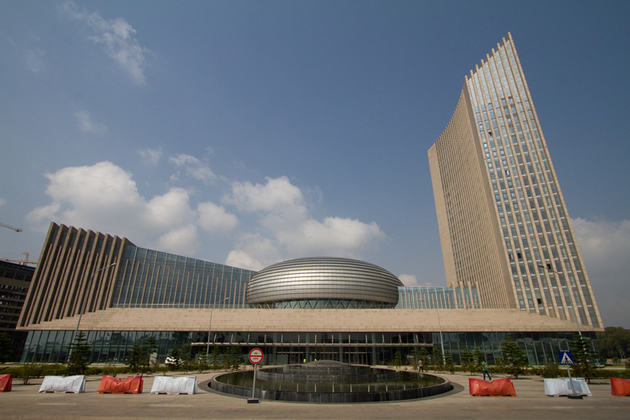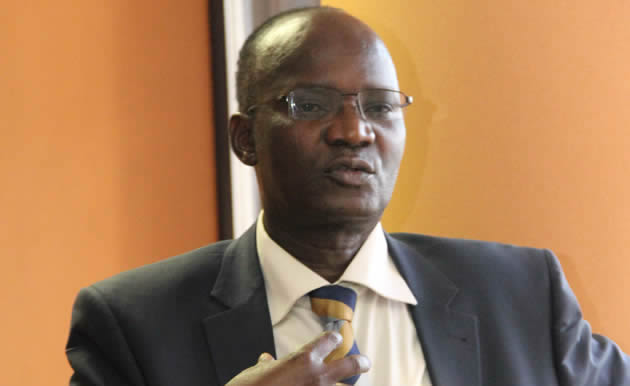Africa, China ties: Beyond the money


China has made a mark on the African continent through its investments in infrastructure such as the African Union headquarters building in Addis Ababa (above), loans and technology
Prof Said Adejumobi Correspondent
It has become a truism to say that the Chinese presence in Africa is growing at breakneck speed and is visible everywhere — in the construction and infrastructure sectors, where high-rise structures (cue the African Union HQ in Addis Ababa), roads and railways are being built; in telecommunications; in consumer goods; and even in petty trading. In sum, China is now Africa’s biggest trading partner, with a trade volume of over $200 billion annually, leaving the United States and Europe in a distant second and third respectively.
This massive trading relationship between China and Africa is not a coincidence — it is something actively promoted by African governments and also encouraged by China’s new market orientation policy. However, the relationship does not stop at economics and trade, there is also a growing social dynamic. Hitherto uncommon, inter-marriages or conjugation are occurring with a new breed of African-Chinese or Chinese-Africans being born, creating unprecedented identities and social spaces.
But can Africa benefit further from its relationship with the Asian giant beyond narrow financial benefit?
For example, what can Africa gain from the fact that China invests heavily in knowledge, research and development; that its universities are very good and well resourced; that its academics are highly valued and well respected in society; that its private sector is well supported; and that its political leadership creates a clear vision and sends clear political signals to the rest of society? Herein lies what Africa can gain from China; not charity, aid or handouts!
New romance
The logic of capitalist production that China has adopted demands an outward search for raw materials, foreign markets, and opportunities for new investments, all of which Africa provides.
For Africa, there are three basic assumptions underlying its new romance with China.
First, its experience of domination and underdevelopment bear a resemblance to that of China, and China’s rise to stardom provides a model, an incentive for Africa, which it needs to watch very closely, if not mimic. In other words, Africa sees in China a possible image of its own future.
Second, the history of political fraternity and solidarity between Africa and China dates back to the anti-colonial struggles in which China stood firmly on the side of the future. It supported liberation movements in Africa by offering them training facilities, education and arms for liberation purposes. Africa remains grateful and feels connected to China.
Third, dealing with China provides an alternative in international economic relations for Africa that is less complicated, non-conditionality based, sensitive to the needs of African governments and is generally considered to be less exploitative.
Doing business with China therefore comes naturally, with relative ease and comfort. China’s remarkable rise to stardom was one of the major wonders of the 20th century. From a rural agrarian economy, the post-WW2 era saw China, especially under Chairman Mao Zedong, initiating a cultural revolution underpinned by a socialist transformation ideology. The rise of Deng Xiaoping and his reformist cadre within the political leadership of China from the 1970s saw a new wave of reforms of the capitalist model to re-energise the economy. Economic pragmatism and unwavering nationalism underpinned China’s economic transformation.
China is now the world’s second-largest economy after the US in absolute terms but was announced as narrowly larger than the US by the IMF in 2014 when relative prices (purchasing power parity) were taken into account.
China’s modernity is beautiful. Its road infrastructure is very advanced.
The eight to twelve lanes in many of its major roads surpass what exists in many Western cities. Beijing airport looks every inch like Dulles International airport in the US while outdoing it. Western food chains like KFC, McDonald’s and Starbucks dot the landscape of China’s major cities and an ostentatious Western lifestyle is fast unfolding in China with flashy cars, beautiful mansions and a new capitalist class of nouveau riche celebrating itself. A new group of young Chinese — those I refer to as the post-Mao free-born generation, tend to have a close affinity with and admiration for Western ways of life.
Africa is emerging, yes, but…
Africa, like China, is in a different kind of transition; from economic stagnation, Africa is emerging as a continent where “the sun shines bright”. The brightness may not be too visible yet, but the prospects of it becoming so are noticeable.
But Africa can only be China if it does things differently. The first lesson from China is the leadership’s commitment to change and social transformation.
Second, there is a need for a clear ideology and strategy of development. I do not see Africa adopting the socialist path to development, but a state nationalist model of development is possible. The contours of social diversity and pluralism and the struggles that African people have waged for liberal democracy make the option of socialist politics remote.
Third, policy ownership and space is something that should never be compromised. Promoting agricultural development and food security, facilitating industrialisation, and creating an e-commerce society may draw from global experiences but the policies have to be rooted in local cultures. China’s testimony is that a country that cherishes its culture and social values can use them to leapfrog its development.
Finally, human dignity and integrity are central to the sense of confidence and self-worth that development requires.
Any group of people, society or community that relies on handouts or aid from others will lose its self-worth and dignity. This has been a major albatross for Africa in the last three decades, especially in the years of the structural adjustment programmes, which some refer to as the “locust years”.
Unfortunately, many African countries still celebrate aid and rely on it to prop up their national budgets. Africa must regain its self-worth and dignity by relying less on handouts, either from the West or East, to power its progress.
Inter-state relations between China and Africa are undoubtedly on the rise, but there is no uniform narrative about Africa amongst Chinese citizens. There are some who see Africa as a new frontier of development and cherish the historical relationship between the two. Others see Africa as a “sleeping” continent that needs to wake up and get its act together as nobody owes Africa a living — which is true.
Some will not be bothered about Africa as it matters less in their configuration about the future and where they aspire to go.
From all these perspectives, there is a lesson for Africa in taking charge of its destiny. — New African.









Comments